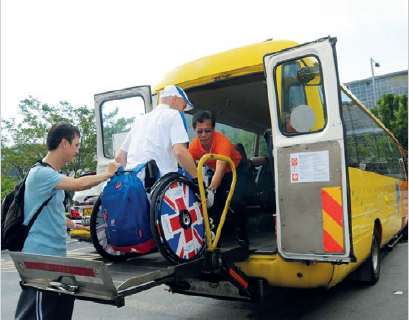Elderly escort services
Scope and target recipients
At present, there are many private and self-financing organisations in Hong Kong that offer elderly escort services. In addition to basic escort services, i.e., accompanying the elderly or people in need to hospitals or clinics for medical consultations, some escort services also cover other activities, such as dining out, going to banquets or shopping, etc.
The service recipients include elderly people living at home or residential care homes, people with reduced mobility, and people in need. While most service providers do not have age restrictions, some do impose age or geographic restrictions, such as giving priority to people over the age of 60 or restricting the services to designated locations.

Application and making appointments
A few organisations require consumers to register in advance or pay a registration fee. When making an appointment, consumers will need to provide details such as appointment date, location of the activity, mode of transportation, and the physical condition, mobility level and medical history of the service recipient. Most service providers require consumers to book at least 1 working day to 2 weeks in advance. For a next-day appointment, an additional fee may be charged.
Form of service and payment arrangements
The organisations generally provide single escort service, and all have minimum hours, ranging from 1.5 to 4 hours, and extra time is generally charged per unit of 15/30/60 minutes. At present, there are mainly 3 payment arrangements: prepayment in full after booking; payment after service; or payment via stored value facilities (SVF). Among them, the most notable one is payment via SVF, whereby consumers must maintain a specified amount of stored value in their account when making an appointment. If the final service fee exceeds the stored value, the balance must be paid within a specified period.
In addition to the basic fee, consumers may also incur additional charges. Some organisations make a distinction between office hours and non-office hours, and charge higher fees during non-office hours; and some will only provide services during office hours. In addition, consumers have to bear the transportation costs of caregivers, which are generally on reimbursement basis. For remote areas or outlying islands, additional transportation allowances or surcharges may be levied.
Changes or cancellations may incur additional charges
Consumers may occasionally need to change or cancel an appointment due to a change of plan. Most organisations allow consumers to make changes by giving 24 hours to 3 working days’ prior notice. If the notice is less than 24 hours, some organisations may charge an additional service fee or forfeit the prepayment.
For cancellations, many organisations require 24 hours to 3 working days' prior notice, while a few may accept 4 hours' prior notice or decide on a case-by-case basis. However, if the notice is less than 24 hours, some organisations may still charge an administrative fee or a 30-minute service fee even if the service is cancelled successfully. If the fee has been prepaid in full, there is a chance that the organisation may not refund at all; some organisations allow consumers to reschedule the service within a specified period, others may make refund decisions based on the reason of the cancellation, and may deduct part of the prepayment.
Elderly escort services – areas for attention
To avoid unsuccessful booking or fee forfeiture, consumers should pay heed to the following matters when using the escort services:
- Book early
Consumers should make arrangements early to avoid surcharges or higher service fees due to short notices. Furthermore, if the care recipient needs special attention, consumers should clearly explain the needs and key attention areas when making an appointment, so that the service provider can make appropriate arrangements early on.
- Fee calculation
Fee calculation varies amongst the organisations. Some charge by the hour and set minimum hours; extra time are charged per unit of 15/30/60 minutes.
3. Transportation allowance
Depending on the location, some organisations will charge related transportation costs or surcharges. Before making an appointment, consumers should check the service provider’s policies on location and related charges.
Most people use escort services for peace of mind and extra protection of the elderly people. To learn more before choosing such services, you may want to refer to the article ‘Issue 500: Elderly Escort Services May Vary Considerably in Costs Difference Can be More Than Double’.
4. Prepayment
Before making a prepayment, consumers should check the policies and arrangements on changes and cancellations, so as to avoid payment forfeiture in such events.
5. Qualifications
Before choosing a service, consumers should first find out the type of qualification or certificate held by the caregiver and the issuing authority, and may request to check the relevant certificate.
6. Compensation insurance
According to the Employees’ Compensation Ordinance, no employer shall employ any employee in any employment unless there is in force a policy of insurance to cover his liabilities under the laws for injuries at work in respect of all of his employees, irrespective of the length of employment contract or working hours, full-time or part-time, etc. Hence, consumers should check whether the caregiver is employed by the engaged organisation and whether the relevant compensation insurance is in place.
Home care services
Select services according to the needs of the elderly
In order to provide better care for the elderly, in addition to choosing escort services, many people also consider home care services. However, there are many types of services, consumers must understand the needs of the elderly before choosing the services. If they need professional services, they should find the right professionals with relevant qualifications.
- Registered nurses or enrolled nurses: Medication injections or peritoneal dialysis, etc.
- Health workers: Wound care, handling urine or stoma bags, nasogastric tube feeding, etc.
- Care workers or personal care workers: Simple daily activities, such as feeding, bathing and changing diapers, etc.
- Physiotherapists: Provide professional training and assessment for rehabilitation needs.
Specific care services for patients
In general, many organisations provide specific care services for patients suffering from stroke, bone fractures, dementia, coronary heart diseases or diabetes, etc., and help them adapt to their home environment, and monitor the progress of their rehabilitation.
- Stroke
Some organisations provide continence care services, and help patients with stretching and lateral exercises. They also help patients improve self-care abilities and carry out activities of daily living. Certain organisations even provide training to improve patients’ speaking ability and swallowing, and speech therapy.
- Bone fractures
Assist bedridden elderly or patients to turn over or sit up in bed, and help prevent wound infection. Caregivers will also provide treatments to prevent muscle atrophy and joint stiffness, so to minimise loss of function at the fracture site and prevent complications.
- Dementia
Provide memory, concentration and cognitive training, as well as care services to prevent falls, incontinence and constipation. In addition, the organisations will also advise on home environment and provide renovation recommendations, as well as give guidance on dealing with emotional and behavioural problems.
- Coronary heart diseases
Provide dietary advice for coronary heart disease patients.
- Parkinson’s disease
Provide services such as bathing, lifting and transfer, and balance exercises, and teach patients skills to prevent falls and improve self-care abilities.
- Diabetes
Services include injections, cooking, exercising, monitoring of glycemic index, and providing dietary advice.
Check the service scope and service hours
The service locations and hours may vary amongst the organisations, and most of them only provide services in designated locations. In addition to their own needs, consumers should also consider the service scope of the organisations when making a choice.
Another important factor to consider is service hours. Currently, only 5 organisations provide 24-hour service. Elderly people and patients who need home care services during night time or throughout the day should pay attention to this!
Check the charges
At present, the charging modes of various organisations can generally be divided into prepayment and payment per single service. One organisation requires prepayment, and consumers have to work out their service requirements for the whole month in advance and prepay for such services. Most of the other organisations, however, accept payment per single service. Some organisations even offer service packages with lower hourly rate (when compared to single-service hourly rate) and validity period of 1.5 to 6 months. Before purchasing a package, in addition to the fee level, consumers should also pay attention to the validity period and service items included, and decide if the package meets their actual needs. Consumers should avoid over-purchasing simply because of the lower hourly price.
In addition to basic service fees, some organisations may levy additional charges depending on the service location and date of service. If service recipients live in remote areas, surcharges may be imposed, and on special days or times such as Chinese New Year, Sundays and public holidays or non-office hours, consumers may even need to pay double service charges!
To ensure that the elderly person at home lives healthily, in addition to arranging home care services, medical check-up is also essential! Watch the video ‘Enjoy Elderly Life: Medical Check-Up Services for the Elderly EP2 - Fees Vary Considerably’ (Chinese version only) and learn more about services catering for the elderly.
Preparation before application
When applying for home care services, the care recipients or their family members should provide simple personal information, medical records, proof of address, and doctor's referral letter (if any). Some organisations will conduct home visits beforehand and determine the service scope based on the physical condition and needs of the care recipients. On the other hand, if the organisations do not conduct home visits beforehand, applicants should then explain the situation of the care recipients in details, so as not to affect the progress of their rehabilitation.
Registered nurses vs enrolled nurses
What is the difference between an enrolled nurse and a registered nurse? Registered nurses must undergo at least 3 years of training, whereas programmes for enrolled nursers are generally 2 years or more in duration. Furthermore, enrolled nurses may need to perform certain nursing tasks under the direction and supervision of registered nurses.
In fact, the Social Welfare Department (SWD) also provides similar home care services. If you have such need or want to learn more about the service scope and eligibility, you may visit the following website:
1. Integrated Home Care Services (Ordinary Cases and Frail Cases)
2. Enhanced Home and Community Care Services
Regardless of home care or escort services, consumers should choose carefully and pay attention to details. To get a better understanding of such services, you may click to read ‘Issue 508: Choose Home Care Services Carefully Hourly Rate May Differ by More Than 4 times’ (Chinese version only).












